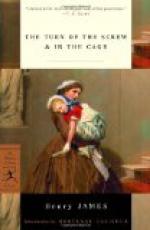“And leave the P.O.?”
“Let the P.O. simply bring you your letters. It would bring you lots, you’d see: orders, after a bit, by the score.” It was on this, in due course, that the great advantage again came up: “One seems to live again with one’s own people.” It had taken some little time (after their having parted company in the tempest of their troubles and then, in the glimmering dawn, finally sighted each other again) for each to admit that the other was, in her private circle, her only equal, but the admission came, when it did come, with an honest groan; and since equality was named, each found much personal profit in exaggerating the other’s original grandeur. Mrs. Jordan was ten years the older, but her young friend was struck with the smaller difference this now made: it had counted otherwise at the time when, much more as a friend of her mother’s, the bereaved lady, without a penny of provision and with stopgaps, like their own, all gone, had, across the sordid landing on which the opposite doors of the pair of scared miseries opened and to which they were bewilderedly bolted, borrowed coals and umbrellas that were repaid in potatoes and postage-stamps. It had been a questionable help, at that time, to ladies submerged, floundering, panting, swimming for their lives, that they were ladies; but such an advantage could come up again in proportion as others vanished, and it had grown very great by the time it was the only ghost of one they possessed. They had literally watched it take to itself a portion of the substance of each that had departed; and it became prodigious now, when they could talk of it together, when they could look back at it across a desert of accepted derogation, and when, above all, they could together work up a credulity about it that




